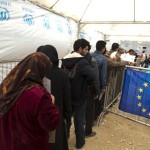External Relations News Digest – 28/04/16
External Relations 28 April 2016Once a week, NEU offers a selection of relevant news on issues related to EU External Relations.
Nagorno-Karabakh: a Resolution Is Completely Off the Radar!
By NEU-Newsletter for the European Union
 Nagorno-Karabakh is a region centred in southern Caucasus, without any access to the sea, but still relevant for the peaceful resolution of a long lasting conflict in the area – on the doorstep of Europe. Speaking of a “frozen conflict” there is not possible since, from the immediate aftermath of the war in 1994 until the present days, analysts and diplomats cannot find those “frozen” peculiarities in Caucasus. In August 2015, a new escalation of violence spread in the region, due to some events. Everything is moving in Nagorno-Karabakh, everything is on fire. Read more here.
Nagorno-Karabakh is a region centred in southern Caucasus, without any access to the sea, but still relevant for the peaceful resolution of a long lasting conflict in the area – on the doorstep of Europe. Speaking of a “frozen conflict” there is not possible since, from the immediate aftermath of the war in 1994 until the present days, analysts and diplomats cannot find those “frozen” peculiarities in Caucasus. In August 2015, a new escalation of violence spread in the region, due to some events. Everything is moving in Nagorno-Karabakh, everything is on fire. Read more here.
Regeni’s Case: Martin Schulz Calls on Egypt to Cooperate
By NEU-Newsletter for the European Union
 “On Regeni’s case, the Egyptian authorities have failed the test so far. The European Union and the European Parliament will continue to be vigilant, calling on the Egyptian authorities to show transparency and to cooperate. Giulio Regeni was an Italian citizen but also a European one. And the European Union supports Italy in its quest for truth,” said Martin Schulz, President of the European Parliament. Giulio Regeni, a 28-year-old Italian post-graduate student, disappeared in Cairo last January. His dead body was found on 3 February beside a road on the outskirts of Cairo, reportedly with marks of torture on him. Any involvement in Regeni’s death have been repeatedly denied by Egyptian officials. Read more here.
“On Regeni’s case, the Egyptian authorities have failed the test so far. The European Union and the European Parliament will continue to be vigilant, calling on the Egyptian authorities to show transparency and to cooperate. Giulio Regeni was an Italian citizen but also a European one. And the European Union supports Italy in its quest for truth,” said Martin Schulz, President of the European Parliament. Giulio Regeni, a 28-year-old Italian post-graduate student, disappeared in Cairo last January. His dead body was found on 3 February beside a road on the outskirts of Cairo, reportedly with marks of torture on him. Any involvement in Regeni’s death have been repeatedly denied by Egyptian officials. Read more here.
European Parliament adopts PNR Directive to Fight Terrorism
By NEU-Newsletter for the European Union
 With 461 votes for and 179 against, the European air passenger data directive was adopted by the European Parliament. Despite strong criticism from the Greens, the left and the Liberals, MEPs voted in unison to strengthen data protection legislation. As a result, PNR data collected and held by air carriers for operational purposes will be shared with national authorities for the prevention of terrorism and serious crime. Nevertheless, even its supporters already admit that it will not be the best panacea to fight terrorism. Read more here.
With 461 votes for and 179 against, the European air passenger data directive was adopted by the European Parliament. Despite strong criticism from the Greens, the left and the Liberals, MEPs voted in unison to strengthen data protection legislation. As a result, PNR data collected and held by air carriers for operational purposes will be shared with national authorities for the prevention of terrorism and serious crime. Nevertheless, even its supporters already admit that it will not be the best panacea to fight terrorism. Read more here.
What the West Should Do Next in Ukraine
By Marieluise Beck & Ralf Fücks on Newsweek
 The diplomatic efforts of the West to find a political solution to the Ukraine conflict have reached an impasse. Implementation of the terms of the Minsk agreement has come to a standstill. There are continual violations of the cease-fire, and every day brings new reports by the Ukrainian army of deaths and injuries. Around 1.5 million people have fled the occupied areas. Up to now, the German government and the EU have avoided plain speaking – their aim was to mediate, not to take sides. This indecisive position has left room for Russian propaganda and makes it difficult to win support for Ukraine among the European public. In this regard, the Dutch referendum is a warning sign. Read more here.
The diplomatic efforts of the West to find a political solution to the Ukraine conflict have reached an impasse. Implementation of the terms of the Minsk agreement has come to a standstill. There are continual violations of the cease-fire, and every day brings new reports by the Ukrainian army of deaths and injuries. Around 1.5 million people have fled the occupied areas. Up to now, the German government and the EU have avoided plain speaking – their aim was to mediate, not to take sides. This indecisive position has left room for Russian propaganda and makes it difficult to win support for Ukraine among the European public. In this regard, the Dutch referendum is a warning sign. Read more here.
Obama ‘confident’ on TTIP as clock runs down
By Matthew Karnitschnig on Politico.eu
 US President Barack Obama said he was “confident” that an agreement on a sweeping but controversial trade deal with the EU could be reached by the end of this year, as Washington and Berlin redoubled efforts to cinch the pact before he leaves office. Given the growing skepticism about free trade deals on both sides of the Atlantic, Obama’s latest endorsement of TTIP, as the transatlantic trade pact is known, is far from a guarantee that it will ever be completed. U.S. and European trade officials have been negotiating TTIP for years. While they’ve made substantial progress in recent months, they have yet to bridge differences in key areas such as agriculture and dispute resolution. Read more here.
US President Barack Obama said he was “confident” that an agreement on a sweeping but controversial trade deal with the EU could be reached by the end of this year, as Washington and Berlin redoubled efforts to cinch the pact before he leaves office. Given the growing skepticism about free trade deals on both sides of the Atlantic, Obama’s latest endorsement of TTIP, as the transatlantic trade pact is known, is far from a guarantee that it will ever be completed. U.S. and European trade officials have been negotiating TTIP for years. While they’ve made substantial progress in recent months, they have yet to bridge differences in key areas such as agriculture and dispute resolution. Read more here.
Europe must take lead on protecting Syrian civilians
By Frederic C. Hof on euobserver
 For more than five years Syria has been dying a slow, violent, and public death. But in five years not a single Syrian civilian inside Syria has been protected from the homicidal rampage of the Assad regime: not one. Are 5 million refugees, 7 million internally displaced, 200,000 dead, countless others terrorised, traumatised and maimed, tens of thousands of people rotting in regime prisons merely someone else’s humanitarian problem? Or is this the essence of the problem that now roils European politics and even crosses the ocean to North America? Read more here.
For more than five years Syria has been dying a slow, violent, and public death. But in five years not a single Syrian civilian inside Syria has been protected from the homicidal rampage of the Assad regime: not one. Are 5 million refugees, 7 million internally displaced, 200,000 dead, countless others terrorised, traumatised and maimed, tens of thousands of people rotting in regime prisons merely someone else’s humanitarian problem? Or is this the essence of the problem that now roils European politics and even crosses the ocean to North America? Read more here.


